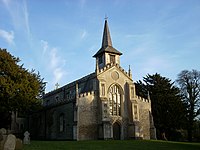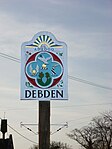Debden, Uttlesford
| Debden | |
|---|---|
Location within Essex | |
| Population | 778 (2011)[1] |
| OS grid reference | TL558335 |
| District | |
| Shire county | |
| Region | |
| Country | England |
| Sovereign state | United Kingdom |
| Post town | SAFFRON WALDEN |
| Postcode district | CB11 |
| Dialling code | 01799 |
| Police | Essex |
| Fire | Essex |
| Ambulance | East of England |
| UK Parliament | |
Debden is a small rural village in the Uttlesford district of Essex in the East of England. It is located 4 miles (6 km) from Saffron Walden and 17 miles (27 km) from Cambridge.
RAF Debden is nearby and played a role in the Second World War.
Since 2007 the village has shared twin status with the village of Tang Ting in rural Nepal.[2]
History
[edit]The village was recorded in the Domesday Book of 1086 as Depeduna (deep valley), and became known as Debden at the time of the Napoleonic Wars.
After the Norman conquest the manor of Debden was granted to Ralph Peverel, but reverted to the crown after Peverel's grandson, William Peverel the Younger, poisoned the Earl of Chester. King John later granted the manor to Geoffrey Fitzpeter, 1st Earl of Essex and it descended in that family until becoming Crown land again. Henry VIII granted it to Lord Audley, from whom it descended to his grandson, Thomas Howard, Baron Howard de Walden and Earl of Suffolk. It was acquired in 1715 by wealthy merchant Richard Chiswell, MP and remained in the Chiswell family for some 100 years. It then passed by marriage to the Vincent family who held it until 1882 when Mrs Cely-Trevilian, the last member of the family, sold it to William Fuller-Maitland of Stansted Mountfitchet Hall. By the First World War it had come into the possession of Lord Strathcona and Mount Royal. Later owners found Debden Hall too expensive to maintain, and so the house was demolished and part of the estate sold off in 1935.[3]
The Church of England Parish Church of St Mary the Virgin and All Saints is Grade I listed. A flint and stone church is 13th century but with considerable 18th-century restoration and rebuilding after the 1698 fall of the central tower which destroyed the chancel. The clerestorey and chancel were rebuilt in 1793 when the west bell turret, spire and parapets of the nave and aisles were probably added. The restoration and rebuilding was done by Richard Muilman Trench Chiswell of Debden Hall, whose elaborate tomb in the chancel was designed by John Carter.
-
Church of St Mary the Virgin and All Saints
-
High Street, Debden in July 2012
-
Village sign
Notable people
[edit]- Henry Vane the Younger (1613–1662), an English politician, statesman, and colonial governor.[4]
See also
[edit]References
[edit]- ^ "Parish population 2011". Retrieved 28 September 2015.
- ^ "Tang Ting Twinning Association". Tangting.org. Retrieved 11 September 2010.
- ^ "Debden history". Retrieved 12 June 2013.
- ^ Yorke, Philip Chesney (1911). . Encyclopædia Britannica. Vol. 27 (11th ed.). pp. 892–894.
External links
[edit]




